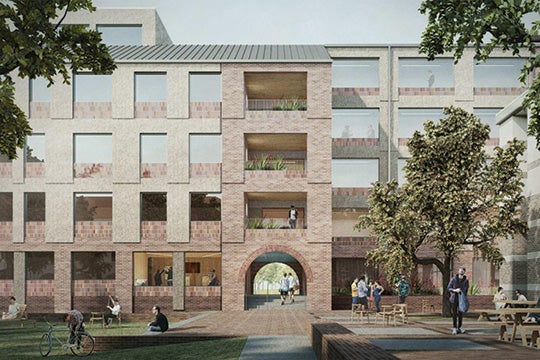Toward 2030
Rice announces ambitious carbon neutral goal supported by initiatives in endowment, faculty research and campus sustainability.

Nearly a decade ago, conscious of the potentially catastrophic consequences of a warming planet, Rice set 2038 as the target year to become carbon neutral. Now, with rapid global action more urgent than ever, the university has accelerated its goal to 2030.
The announcement of the more ambitious date makes climate change initiatives even more central to the university’s goals and practices. Rice will redouble efforts to identify areas in which it can reduce emissions and improve infrastructure. At the same time, it will offer more resources to faculty, staff and students — partners in the push to net zero — for research and projects focused on creating a sustainable future.
“The importance of setting our carbon neutral goal for 2030 rather than a later date is because it changes decisions that we at Rice make now,” says Richard R. Johnson, executive director for sustainability and co-director of the Environmental Studies program. “That’s the point — we as a civilization need to take action now and reduce emissions now, not 30 years from now.”
Rice will use its endowment to drive solutions to climate change through additional investments and dialogue with fund managers. The endowment’s energy portfolio is set to be carbon neutral by 2030, too. The university is committed to becoming a leader in campus sustainability practices, using Rice and its operations as a living laboratory to study sustainability and resilience challenges, incubate ideas and pilot solutions.
The importance of setting our carbon neutral goal for 2030 rather than a later date is because it changes decisions that we at Rice make now. That’s the point: we as a civilization need to take action now and reduce emissions now, not 30 years from now. — Richard R. Johnson
Currently under construction, Hanszen College’s new wing, for example, will feature an innovative mass timber structure — an engineered wood product that replaces concrete and steel elements, which generate more greenhouse gas emissions during manufacturing.
Students, too, will be a key part of the solution. Already, undergraduates have led major sustainability projects, including food waste composting in Rice’s residential colleges. Since November 2020, the program has diverted over 175,000 pounds of food waste from landfills to composting.
“Students have been leading and contributing to campus sustainability efforts for years,” says Ashley Fitzpatrick ’22, who headed the Rice Environmental Society. Fitzpatrick worked on a sustainable laundry detergent program. Others are helping the Houston Zoo create a plan to reach carbon neutral. A student sustainability engagement fund for 2023 will finance internship grants and more partnerships between Rice and Houston-area organizations.

Faculty and staff will contribute through research. Rice’s new, annual Sustainable Futures Seed Fund — planned for at least the next five years — will cover beginning stages of interdisciplinary research on a broad range of environmental challenges. Faculty proposals include improving storm resiliency in underserved urban communities.
“We really need to be thinking in an interdisciplinary way,” says Carrie Masiello, the W. Maurice Ewing Professor of Biogeochemistry and a member of a 100-plus-person interdisciplinary faculty group that exchanges ideas around climate change. “And folks are excited about testing new approaches.” — Deborah Lynn Blumberg
